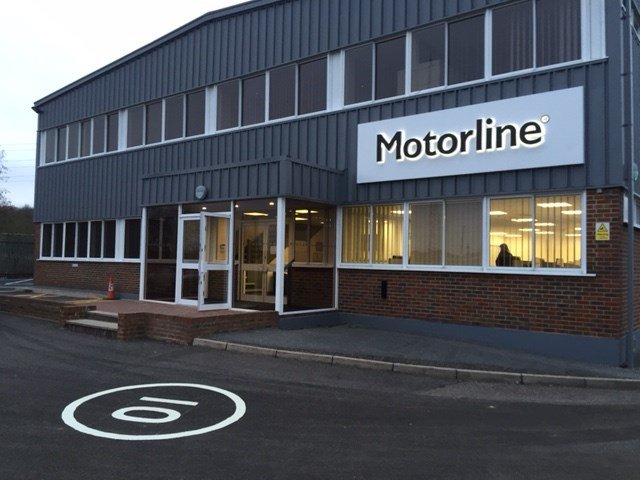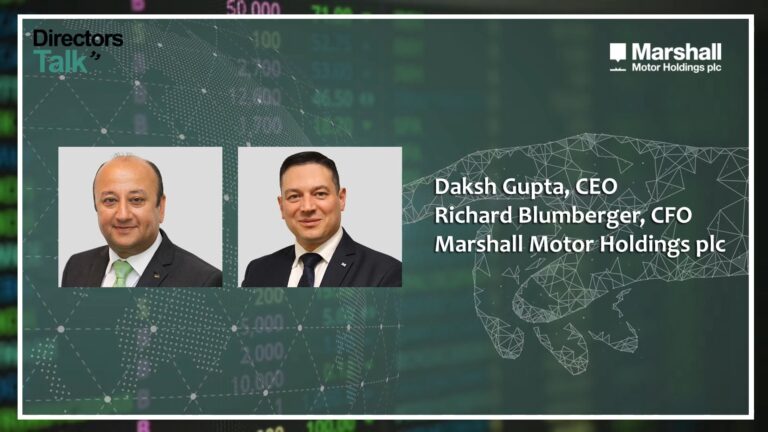Marshall Motor Holdings plc (LON:MMH) Chief Executive Officer Daksh Gupta and Chief Financial Officer Richard Blumberger caught up with DirectorsTalk to discuss the highlights from their full-year results, how they continue to outperform the market, key financial movements, balance sheet strength and further acquisitive growth opportunities.
Q1: Daksh, a good performance from Marshall Motor Holdings in the face of significant market declines. Can you talk us through some of your highlights?
A1: Well, I do have to say that 2020 will of course be remembered as a difficult year for all of us, but I also have to say that I’m really proud of our performance last year in so many ways. Now we do have to put some balance on this, we did benefit from sector tailwinds immediately after the first lockdown, and of course we benefitted from government support, for which we’re extremely grateful. That said, I don’t want to take anything away from our teams because once again they delivered an outstanding performance in challenging market conditions.
Despite our dealerships being closed for three and a half months, our revenue was down just 5.3% to £2.15bn. This was not only due to prior year acquisitions and pent up demand, it was also due to our strong outperformance of the market across all our key operational KPIs. This was underpinned by further investment in our brand and digital propositions.
This drove our like‐for‐like TOTAL new unit sales double digit ahead of the market, and within this, our like‐for‐like new retail unit sales were 9.7% ahead of the market.
On fleet, our like‐for‐like unit sales were 8.5% ahead of the market and finally we also delivered a pleasing like‐for‐like used car performance, which was also market beating. As you can see, a clean sweep of outperformance across the board once again, just as we delivered last year.
We also performed well in aftersales, here our like‐for‐like revenue was down just 13.7%, that’s despite the impact of the various lockdowns through the year, so an excellent result given the circumstances. o All of this meant that we managed to overturn our first half loss to deliver an underlying profit before tax of £20.9m, and it’s worth saying that this was actually ahead of our original 2020 market forecast, and double‐digit ahead of our last RNS guidance on the 9th of December.
None of this would have been possible without the support of our key stakeholders, our customers, our incredible colleagues, our brand partners, and shareholders. All have been fantastic and I would like to take this opportunity to thank them for their support on behalf of the Board.
Q2: You mentioned outperformance Daksh, how is it that the company continually outperforms the overall market?
A2: Well, I have to say that we are very proud of our long track record of outperformance. In fact, as a result of the pandemic, last year was the FIRST year where the business has NOT delivered like for like revenue growth since I took over as CEO 13 years ago.
To answer your question though, the truth is, there’s no silver bullet to this. We have a number of differentiators that enable this consistent outperformance. Firstly, we have a very stable, long serving and committed management team which makes a huge difference.
Secondly, we have a great culture in the business. This is demonstrated by the fact we are ranked as one of the best UK workplaces and we have achieved the great place to work status for 11 years in a row. This is also demonstrated by the fact that one of our leading industry publications named our company ‘industry employer of the year’ for 2020. This strong colleague engagement ultimately delivers great customer satisfaction and retention.
We also have Phoenix, which is our bespoke, in‐house developed MI system. Phoenix enables to integrate acquisitions quickly, have visibility of stock, drive better working capital, enhance margins, improve efficiencies, and increase customer service. All of which off course leads to better returns.
We also have a strong omni‐channel proposition with our well‐established brand website Marshall.co.uk, which for the first time in 2020, we started to promote live on TV. Since we started this, our brand has been viewed by well over 100 million people and we’ve enjoyed over 300 million impressions online.
In addition, we have further enhanced our online proposition with enhanced auto imaging and video. We have also enabled the ability for customers to reserve online for just £99, offer nationwide delivery or collection from one of our 113 brand centres, 14‐day money back guarantee, finance packages which are haggle free, often sub‐vented by our brand partners and come with free service plans. And let’s not forget, we are one of the largest retailers in the Country so have over 16,000 cars in stock, which ultimately offers more choice for our customers. All of this is supported by our existing, well established physical infrastructure and brand partnerships which provides us with a real competitive advantage.
Finally, we are also a leading consolidator in the sector since I took over as CEO in 2008 the business has bought and sold over 167 businesses. This hasn’t just been indiscriminate M&A for the sake of scale, we have consistently focused on portfolio management as well as ensuring we have the right brands in the right markets.
In summary, we have a strong platform to continue to drive organic growth but also have an enviable track record of M&A also.
Q3: Richard, turning to you on the financials, understandably, a drop in revenues in the year but PBT only marginally down. Could you talk us through some of the key movements?
A3: As you quite rightly say, full year revenue was down 5.3% and like‐for‐like revenue was down 13.5%, but this really was a tale of two halves, with the full year benefitting from a very strong second half, which saw revenues up 15.2% year‐on‐year. Clearly the full year was affected by the various lockdowns and restrictions, resulting in the full year reported revenue being down.
Looking at gross margins, we saw they were down 40bps at 11.1%, but again this was buoyed by a strong second half performance. Our overall margins were affected by us not being able to overachieve targets as a result of the various trading restrictions, something which we normally expect to do.
Pleasingly, our aftersales margins increased by 74bps, and this was largely driven by two factors: an increase in the mix of service revenues, but also more rigour around service pricing.
Operating expenses, including acquisitions, were down over £20m, largely reflecting the support we received from Local and Central Governments of £27.6m, which we remain very grateful for. Expenses in the year also reflected our strong cost control around variable costs, in such things as fuel, running costs and marketing.
Overall, this left underlying PBT at £20.9m, 5.2% down on last year.
Q4: Your cash position still appears to be strong, can you talk to us about how you are feeling about your balance sheet strength at the moment?
A4: As you have seen, we had a phenomenal cash performance and further strengthened our net assets in the year.
Despite the difficult trading environment, we continued, where it made sense, our property investment, and this included Audi Wimbledon, Audi Newbury and started the exciting Volvo Derby project.
This leaves our freehold land and building at £125.8m, and of course we do not include the increase in valuation of around £15m which we had valued at the end of 2019.
Inventory saw a massive reduction, down over £100m or £92m on a like‐for‐like basis, which is a 22% reduction year‐on‐year.
We continued our keen focus on stock control and our used car stock turn was at 9 times, broadly the same level as last year, which is way in excess of our 56‐day stocking policy, which would give 6.5 turns.
Trade and other receivables was down £21.7m largely as a result of the lower fleet business due to COVID restrictions resulting in less corporate deals.
One of the consequences of the trading environment in 2020 was that stock funding is over 100% and that is a result of the changing mix of stock and the effect this has on the relative proportion of used to consignment stock which has been exaggerated by both the new car supply restrictions and the used car strong demand.
Overall, this gave net assets of £215.9m, up £13.6m in the year and equates to £2.76 per share.
So overall we generated £59.4m of cash, driven by the incredibly strong H2 EBITDA performance and the reduction of inventory and debtors I just spoke about.
It is worth mentioning that some of this high stock funding and low debtors is not permanent.
We took strong management actions and our capital expenditure programme was lower in the year for all the reasons we know about, but we still invested £11.7m in the year, including the purchase of two freeholds for our dealerships which were previously operating as a leasehold. We expect this to return to more normalised levels in 2021.
We continued our strong property portfolio management and disposed of properties linked to site closures and an investment property and that generated us around £5m.
And as we have said previously the Board took the prudent decision to cancel the 2019 dividend ahead of the AGM in May 2020, as we were at the height of the pandemic, and not to declare any dividends in 2020 which we felt would have been inappropriate given the government support that we received. What I would say though, is the Board understands the importance of dividends to our shareholders and intends to resume the payment of dividends as soon as conditions allow and we will consider the position next at the time of release of our interim results in August 2021.
Overall, that gave us an Adjusted Net Cash position of £28.8m in the year and, as I just said, this was up nearly £60m in the year.
Q5: Finally, Daksh, you mentioned Marshall Motor Holdings’ track record of being an industry consolidator, do you see further acquisitive growth opportunities?
A5: Yes, I do, we’ve previously spoken in detail on the changes that the industry is going through as a result of changing sentiment towards climate change and the need for OEMs to invest in electrification.
We see the overall trend towards industry consolidation continuing to accelerate as a result of COVID‐19. The challenges in the economy are leading to an increase in distressed businesses which creates significant opportunities for us. As a result, our pipeline of opportunities is busy.
As you have heard from Richard, our balance sheet is very strong. The firepower at our disposal leaves us very well placed to capitalise on any opportunities should they arise.
Our solid platform, excellent relationships with our brand partners, and headroom to grow should the right opportunities arise leaves us very well placed.
However, as we’ve consistently said, the Group will only make the acquisitions where they make strategic sense for the business and financial sense for our shareholders.






































